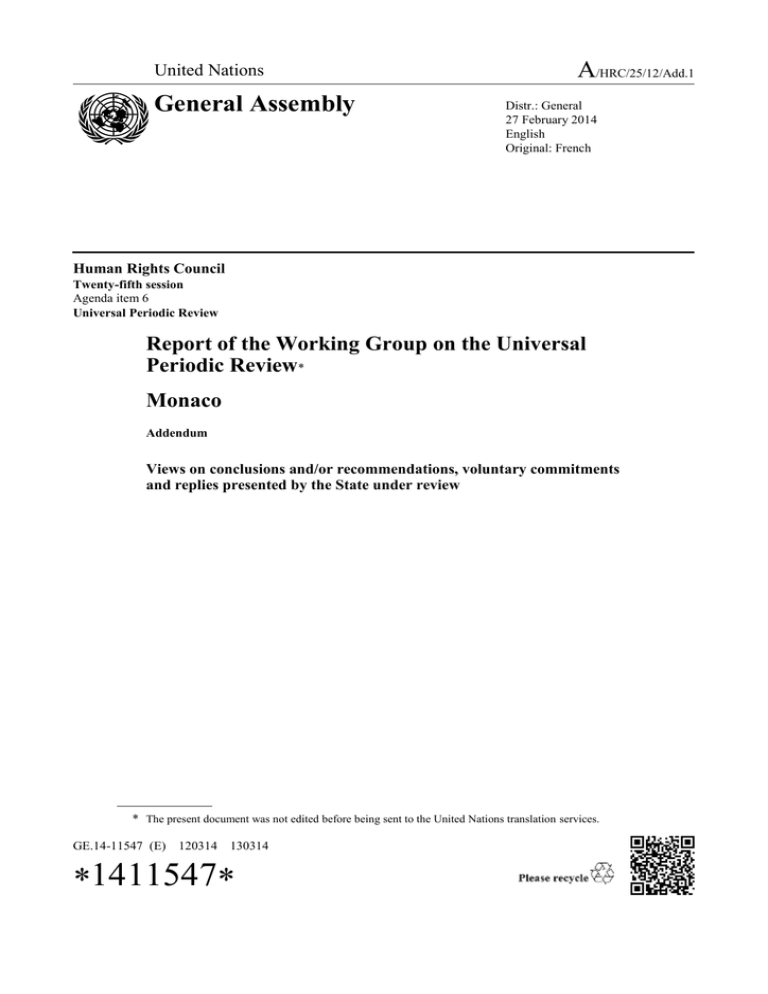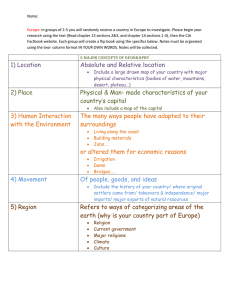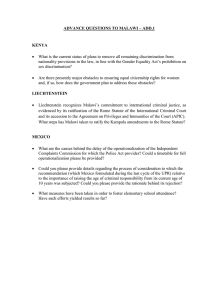A General Assembly Report of the Working Group on the Universal
advertisement

United Nations General Assembly A/HRC/25/12/Add.1 Distr.: General 27 February 2014 English Original: French Human Rights Council Twenty-fifth session Agenda item 6 Universal Periodic Review Report of the Working Group on the Universal Periodic Review* Monaco Addendum Views on conclusions and/or recommendations, voluntary commitments and replies presented by the State under review * The present document was not edited before being sent to the United Nations translation services. GE.14-11547 (E) 120314 130314 A/HRC/25/12/Add.1 1. The Principality of Monaco takes due note of the recommendations made at its second review during the seventeenth session of the Working Group on the Universal Periodic Review (UPR), held on 28 October 2013. 2. In accordance with paragraphs 27 and 32 of the annex to United Nations General Assembly resolution 5/1 and paragraph 16 of the annex to resolution 65/281, Monaco provides information in this addendum regarding its position on all the recommendations made to it, including those in the section on recommendations to be examined in paragraph 90 of the report of the Working Group on the Universal Periodic Review (see document A/HRC/WG.6/17/L.10, paragraphs 90 to 90.19). 3. During the preparation of the report of the Working Group on the Universal Periodic Review, adopted on 31 October 2013, Monaco announced that it was endorsing 51 of the 81 recommendations made. 4. Monaco also stated that it could not endorse 11 of the recommendations. 5. Lastly, it was noted that a reply would be provided at a later stage with regard to 19 of the recommendations. Comments by Monaco on the recommendations it accepted during the preparation of the report of the Working Group (document A/HRC/WG.6/17/L.10, para. 89) 6. Monaco would like to make some comments on recommendations it accepted, in particular those which are already being implemented. Recommendations 14 to 23 on the establishment of a national human rights institution1 7. Monaco notes that Sovereign Order No. 4524 of 30 October 2013 established a High Commissioner for the protection of rights and freedoms and mediation to perform functions that include those previously entrusted to the Minister for Appeals and Mediation. 8. The High Commissioner for the protection of rights and freedoms and mediation is thus responsible for handling appeal and mediation disputes between citizens and the administrations and public services, which include the executive branch departments under the direct authority of the Minister of State and also the departments attached to the judiciary, the National Council (parliament), the Commune and public institutions. 9. It should be emphasized that the function of High Commissioner is designed to ensure a number of guarantees, such as neutrality, impartiality and operational and financial independence. 10. The guarantees enshrined in the above Order also apply to the procedures for referral of cases to the High Commissioner and its powers of investigation and recommendation to the administrative authorities. Recommendation 39 on complaints against the police2 11. Monaco wishes to recall the aspects highlighted during the review, such as the special police service responsible for investigating offences allegedly committed by police officers and which reports directly to the Minister of State. 12. 2 It should also be noted that effective remedies are already guaranteed by law. GE.14-11547 A/HRC/25/12/Add.1 Recommendation 40 on persons convicted in Monaco and serving their sentences in France3 13. Monaco wishes to recall the issues highlighted during the review, including the finalization of an agreement with France to enable a Monegasque judge to make periodic visits to the prisons concerned to check that detention conditions are in line with the standards prevailing in Monaco. Recommendation 45 on the protection of foreign workers, including through the revision of relevant legislation on their working conditions4 14. Monaco accepts this recommendation because all legally employed workers in Monaco already enjoy the same working conditions. Recommendation 46 on the protection of foreign workers from any form of discrimination, particularly in terms of access to social and health-care services5 15. Monaco accepts this recommendation given that all legally employed workers in Monaco, whether foreign or local, already enjoy the same working conditions and social security cover in the event of illness and work-related accidents. Recommendation 51 on the recovery of funds of illicit origin6 16. Monaco wishes to recall the points highlighted during the review, including the fact that Monaco provides effective judicial cooperation, irrespective of whether an agreement exists with the requesting State. 17. Monaco cooperates on the basis of the principle of reciprocity and provides assistance to the various international organizations combating money-laundering. 18. Consideration is also being given to setting up an agency to manage and administer all funds that might be frozen by the Monegasque authorities. Replies by Monaco to the recommendations in respect of which no information was provided during the preparation of the report of the Working Group (document A/HRC/WG.6/17/L.10, para. 90) 19. Monaco cannot provide a formal response at this stage to the recommendations contained in paragraph 90 of the report of the Working Group but agrees to continue present discussions. GE.14-11547 3 A/HRC/25/12/Add.1 Recommendations 1, 2 and 37 on the Optional Protocol to the International Covenant on Economic, Social and Cultural Rights and the Optional Protocol to the Convention on the Elimination of All Forms of Discrimination against Women 20. Monaco notes that studies regarding the two above Protocols have been started and that time should be allowed for their completion. Recommendations 4 and 5 on the ratification of the Optional Protocol to the Convention against Torture and Other Cruel, Inhuman or Degrading Treatment or Punishment8 21. Monaco points out that it has only one prison in its territory, which holds on average between 20 and 30 detainees serving short sentences and, as such, cannot be considered a detention centre. 22. Furthermore, no cases of ill-treatment or poor material conditions have been identified or even alleged for decades. Recommendations 10, 11, 12, 13, 14, 15 and 16 on the ratification of the Rome Statute of the International Criminal Court9 23. Ratification of the Rome Statute of the International Criminal Court would require extensive reform of various legal instruments, particularly the Constitution, the Criminal Code and the Code of Criminal Procedure. 24. Nevertheless, Monaco is determined to cooperate with the International Criminal Court, on a case-by-case basis, whenever the Court requests its collaboration. 25. Monaco has thus already executed a request for assistance from the Prosecutor of the Court. Recommendations 6, 7, 8 and 9 on the ratification of the International Convention for the Protection of All Persons from Enforced Disappearance10 26. Monaco signed the International Convention for the Protection of All Persons from Enforced Disappearance on 7 February 2007; however, the subsequent examination of the provisions of the Convention revealed inconsistencies with the constitutional and legislative provisions of Monegasque law. Recommendations 17, 18, and 19 on accession to the International Labour Organization (ILO) and some of its Conventions11 27. Accession to ILO and some of its conventions raises the question of compatibility with trade union rights in Monaco and the system of priority in employment. 4 GE.14-11547 A/HRC/25/12/Add.1 Comments by Monaco on the recommendations it did not accept during the preparation of the report of the Working Group (A/HRC/WG.6/17/L.10, para. 91) Recommendations 1, 2, 3 and 4 on the ratification of the International Convention on the Protection of the Rights of All Migrant Workers and Members of Their Families12 28. Monaco is currently not in a position to ratify the International Convention on the Protection of the Rights of All Migrant Workers and Members of Their Families on account of country-specific conditions related to priority employment and accommodation for nationals. 29. However, taking into account the small size of the country, the labour inspections carried out and the surveillance operations by the Police Department, the presence of undocumented persons in Monaco is highly unlikely. 30. Lastly, Monaco recalls that non-Monegasque workers enjoy full rights to health and education. Specific support measures are in place for the most vulnerable groups and strict inspections of working conditions are implemented to prevent all forms of exploitation. Recommendation 5 on the implementation of the recommendations of the Venice Commission of the Council of Europe13 31. Recalling that the Venice Commission of the Council of Europe issues advisory opinions, Monaco notes that it cannot commit itself to implementing all the points raised in the opinion issued concerning the Constitution of Monaco. 32. Generally speaking, Monaco reaffirms the commitment of the highest authorities and of the population to maintaining the current institutional model. 33. Lastly, it recalls that it accepted the recommendation contained in paragraph 89.10 on the adoption and implementation of a law on the organization of the National Council, pursuant to the Constitutional amendment of 2002. Recommendation 6 on the decriminalization of defamation14 34. Monaco has no plans to decriminalize defamation, which is a similar offence to injurious behaviour and may be of a racist or homophobic nature. 35. Although defamation is specifically criminalized, this is not an obstacle to freedom of expression. The very purpose of its criminalization is to protect persons against defamation on account of their membership of any particular group. Recommendations 7, 8 and 11 on discrimination in employment15 36. The Constitution and the legislation and regulations in force in Monaco contain no discriminatory provisions on the grounds of race, colour, sex, language or religion. 37. In the case of nationality, it is not a question of discrimination, but of giving priority to protecting nationals, who are a minority in their country, insofar as they account for less than 25 per cent of residents, and who could no longer, without such protection, work in their own country. GE.14-11547 5 A/HRC/25/12/Add.1 38. Accordingly, Monaco has no plans to amend its legislation in this regard, to the extent that part of the population of Monaco would otherwise have to seek employment abroad. 39. Lastly, it should be recalled that all legally employed workers in Monaco enjoy the same working conditions regardless of race, sex, religion and nationality, in accordance with the conventions to which Monaco is a party. Recommendation 9 on the eligibility of naturalized Monegasques16 40. In accordance with the terms of the Constitution, naturalized Monegasques are fully legally eligible for parliamentary and communal elections. 41. Articles 54 and 79 of the Constitution include only one condition related to age and the minimum period that must have elapsed since naturalization. 42. Monaco has no plans to amend its Constitution in this respect. Recommendation 10 on the independence of the judiciary17 43. The independence of the judiciary is fully covered by the current provisions of the Constitution, which were recently implemented by Act No. 1364 of 16 November 2009 governing the judiciary — which established the High Council of the Judiciary — and Act No. 1398 of 24 June 2013 on judicial administration and organization. 44. There are no plans to amend the Constitution in this regard. Notes 1 6 89.14 Strengthen the national unit for the protection of human rights within the Department of Foreign Affairs of the Monegasque Government and work towards the establishment of a national human rights institution (France); 89.15 Consider amending the institution of the Ombudsman currently available, so that it is more independent from the office and it can address human rights controversies among citizens and the various State institutions in an impartial and autonomous manner (Mexico); 89.16 Set up an independent body responsible for human rights (Algeria); 89.17 Create an independent national human rights institution in conformity with the Paris Principles (Tunisia); 89.18 Establish a national human rights institution, whose functioning is in accordance with the Paris Principles (Costa Rica); 89.19 Establish an independent national human rights institution in conformity with the Paris Principles, providing it with the necessary human and financial resources to effectively exercise its functions, including the investigation of allegations of torture (Uruguay); 89.20 Consider the establishment of an independent national human rights institution, within, and in accordance with the appropriate domestic procedural and legal framework (Maldives); 89.21 Consider establishing an independent national human rights institution in conformity with the Paris Principles and set up an independent human rights structure to receive human rights complaints from individuals (Slovenia); 89.22 Consider establishing an independent human rights institution in conformity with the Paris Principles (Indonesia); 89.23 Establish a mechanism that monitors gender equality in employment, wage discrimination against women and discrimination on sexual orientation (United Kingdom of Great Britain and Northern Ireland). GE.14-11547 A/HRC/25/12/Add.1 2 3 4 5 6 7 8 9 10 GE.14-11547 89.39 Put in place an independent procedure to monitor complaints of human rights violations by the police (United Kingdom of Great Britain and Northern Ireland). 89.40 Consider establishing a mechanism to monitor the conditions of execution of the sentence of the convicted prisoners deprived of their liberty in France (Costa Rica). 89.45 Strengthen the protection of foreign workers in the country, including through the revision of relevant legislation on their working conditions (Thailand). 89.46 Adopt the pending legislation on harassment and violence in the workplace and continue to ensure protection of non-Monegasque workers from any form of discrimination, including in terms of access to social and health services (Republic of Moldova). 89.51 Guarantee the cooperation and responsiveness of financial institutions with regard to requests for the recovery of funds of illicit origin (Tunisia). 90.1 Ratify the Optional Protocol to the International Covenant on Economic, Social and Cultural Rights in order to increase the possibilities for complaints and investigation by the Committee on Economic, Social and Cultural Rights, and thereby bringing such protection system at the same level of the existing one with regard to civil and political rights (Spain); 90.2 Ratify the Optional Protocol to the Convention on the Elimination of All Forms of Discrimination against Women (France); 90.3 Ratify the Optional Protocol to the Convention on the Elimination of All Forms of Discrimination against Women to better fight against discrimination against women and to ensure greater protection of such group (Spain). 90.4 Ratify the Optional Protocol to the Convention against Torture (Brazil); ratify the Optional Protocol to the Convention against Torture (France); 90.5 Ratify the Optional Protocol to the Convention against Torture and Other Cruel, Inhuman or Degrading Treatment or Punishment (Estonia); ratify the Optional Protocol to the Convention against Torture and Other Cruel, Inhuman or Degrading Treatment or Punishment (Togo). 90.10 Ratify the Rome Statute of the International Criminal Court (Montenegro); ratify the Rome Statute of the International Criminal Court (Australia); ratify the Rome Statute of the International Criminal Court (France); ratify the Rome Statute of the International Criminal Court (Brazil); 90.11 Continue to consider ratifying the Rome Statute of the International Criminal Court (Tunisia); 90.12 Ratify the Rome Statute of the International Criminal Court (ICC) and fully align its national legislation with all obligations under the Rome Statute, including by incorporating provisions to cooperate promptly and fully with the ICC, and to investigate and prosecute genocide, crimes against humanity and war crimes effectively before its national courts (Netherlands); 90.13 Ratify the Rome Statute of the International Criminal Court, fully align its national legislation with the obligations under the Rome Statute and accede to the Agreement on Privileges and Immunities of the International Criminal Court (Ireland); 90.14. Ratify/accede to the Rome Statute of the International Criminal Court, to implement it fully at national level and to accede to the Agreement on Privileges and Immunities of the International Criminal Court (Slovakia); 90.15 Ratify the Rome Statute of the International Criminal Court and the Agreement on the Privileges and Immunities of the International Criminal Court, and to fully align its national legislation with the obligations contained therein (Estonia); 90.16 Accelerate the internal procedures to ratify the Rome Statute of the International Criminal Court, and adhere to the Agreement on Privileges and Immunities of the International Criminal Court, as well as to the Convention on the Non-Applicability of Statutory Limitations to War Crimes and Crimes against Humanity (Uruguay). 90.6 Ratify the International Convention for the Protection of All Persons from Enforced Disappearance (Argentina); 90.7 Ratify the International Convention for the Protection of All Persons from Enforced Disappearance, which Monaco signed in 2007 (France); 90.8 Continue to consider ratifying the International Convention for the Protection of All Persons from Enforced Disappearance (Tunisia); 90.9 Accelerate the legislative procedures and judicial reforms aimed at the ratification of the International Convention for the Protection of All Persons from Enforced Disappearance and recognize the competence of its monitoring body (Uruguay). 7 A/HRC/25/12/Add.1 11 12 13 14 15 16 17 8 90.17 Examine the incompatibilities of national legislation that prevent its adherence to the ILO and ratify its conventions, in particular ILO Conventions No. 111 and No. 87 (Uruguay); 90.18 Become a member of the International Labour Organization and the respective conventions (Germany); 90.19 Consider ratifying the fundamental ILO conventions (Nicaragua). 91.1 Ratify the International Convention on the Protection of the Rights of All Migrant Workers and Members of Their Families (Argentina); ratify the International Convention on the Protection of the Rights of All Migrant Workers and Members of Their Families (Algeria); 91.2 Consider the possibility of ratifying the International Convention on the Protection of the Rights of All Migrant Workers and Members of Their Families (Ecuador); 91.3 Consider ratifying the International Convention on the Protection of the Rights of All Migrant Workers and Members of Their Families (Nicaragua); 91.4 Adhere to the International Convention on the Protection of the Rights of All Migrant Workers and Members of their Families and recognize the competence of the Committee (Uruguay). 91.5 Consider enacting Venice Commission recommendations to bring some of its laws formally in line with its already democratic practices (United States of America). 91.6 Decriminalize defamation and make it part of the Civil Code (Ireland). 91.7 Take measures in order that the Constitution and other national legislation contain proper provisions that clearly establish the principle of equal treatment and non-discrimination on the grounds of race, colour, ethnic origin, nationality, language or religion (Mexico); 91.8 Continue its efforts to consolidate the legislative framework in the field of the protection against discrimination, in particular in relation to the employment of non-nationals (Netherlands); 91.11 Conduct an analysis of the discriminatory treatments that may be affecting foreigners, especially in the field of employment, and consider amending its legislation in accordance with the result of this study (Canada). 91.9 Review and abolish those legal and practical measures which precluded the naturalized Monegasques, being eligible for elections, in particular articles 54 and 79 of the Constitution in order to remove any inappropriate differentiation between its citizens (Islamic Republic of Iran). 91.10 Consider ways to further ensure the independence of the judiciary, such as vesting the High Council of Judges and Prosecutors in the Constitution (United States of America). GE.14-11547



